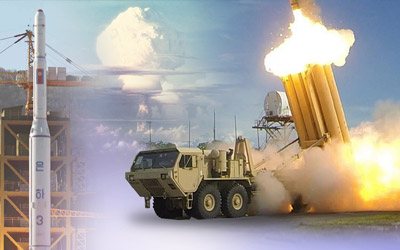- California Assembly OKs highest minimum wage in nation
- S. Korea unveils first graphic cigarette warnings
- US joins with South Korea, Japan in bid to deter North Korea
- LPGA golfer Chun In-gee finally back in action
- S. Korea won’t be top seed in final World Cup qualification round
- US men’s soccer misses 2nd straight Olympics
- US back on track in qualifying with 4-0 win over Guatemala
- High-intensity workout injuries spawn cottage industry
- CDC expands range of Zika mosquitoes into parts of Northeast
- Who knew? ‘The Walking Dead’ is helping families connect
S. Korea, US hold off THAAD talks
SEOUL (Yonhap) — South Korea and the United States have postponed the launch of formal talks on deploying a high-tech U.S. missile defense system, THAAD, on the peninsula amid speculation that the decision may be linked with efforts to adopt a U.N. resolution against Pyongyang as early as possible.
U.S. Secretary of State John Kerry and his Chinese counterpart Wang Yi plan to meet in Washington D.C. later this week.
China has vehemently opposed the deployment of the Terminal High Altitude Area Defense system on the peninsula, especially sensitive to its long-range radar.
South Korea and the U.S., however, expect China’s cooperation in adopting what they call a “terminating” resolution on Pyongyang at the U.N. Security Council to punish the country for its recent nuclear test and long-range rocket launch.
Seoul and Washington had initially planned to sign the agreement on a joint working group’s negotiations on the possible THAAD deployment.
The allies “decided to put off the signing of the terms of reference, which was originally slated for today,” Moon Sang-gyun, spokesman at the Ministry of National Defense said.
They are “in the final stages” of preparations for signing the accord, Moon said, adding some details have yet to be ironed out. He said a deal would be possible within this week.
Seoul and Washington will then establish the working group to negotiate the sensitive THAAD issue, including cost-sharing, a candidate site and a specific timetable.
Hours after North Korea launched a long-range rocket carrying a satellite on Feb. 7, the allies announced plans to begin talks on bringing THAAD to the peninsula as part of efforts to counter North Korea’s advancing nuclear and missile threats.
Seoul and like-minded countries denounced the February satellite launch as a cover for testing the communist country’s intercontinental ballistic missile technology.
The allies’ last-minute postponement on Tuesday came as Chinese Foreign Minister Wang Yi is set to hold talks in Washington with U.S. Secretary of State John Kerry on the United Nations Security Council’s punitive actions over North Korea’s nuclear test in January and the recent long-range rocket launch.
Such timing raised speculation that Seoul and Washington may have decided to hold off on their discussion on the sensitive air defense system’s deployment, having been mindful of China’s protests.
The defense spokesman, however, dismissed those views, saying, “The U.N.’s sanctions on North Korea and the THAAD deployment are separate issues.”
The out-of-the-blue decision also spawned conjectures that Seoul and Washington may have hit a snag in their negotiations.
“South Korea and the U.S. are not at odds, they are simply coordinating (positions) internally,” said a defense ministry official, refuting the claims and asking not to be named.
Some sources noted the postponement was made at the request of Washington.
As the speculations spiraled, Lt. Gen. Thomas Vandal, commander of U.S. Forces Korea’s Eighth Army, visited the defense ministry earlier in the day to clarify its position over the allegedly U.S.-proposed postponement.
“An on-going dialogue between USFK and the U.S. government has yet to be finalized,” Vandal was quoted by the ministry as saying during the visit.
The terms of reference could be signed as early as Wednesday, but it could be delayed a little more, the commander said.

















